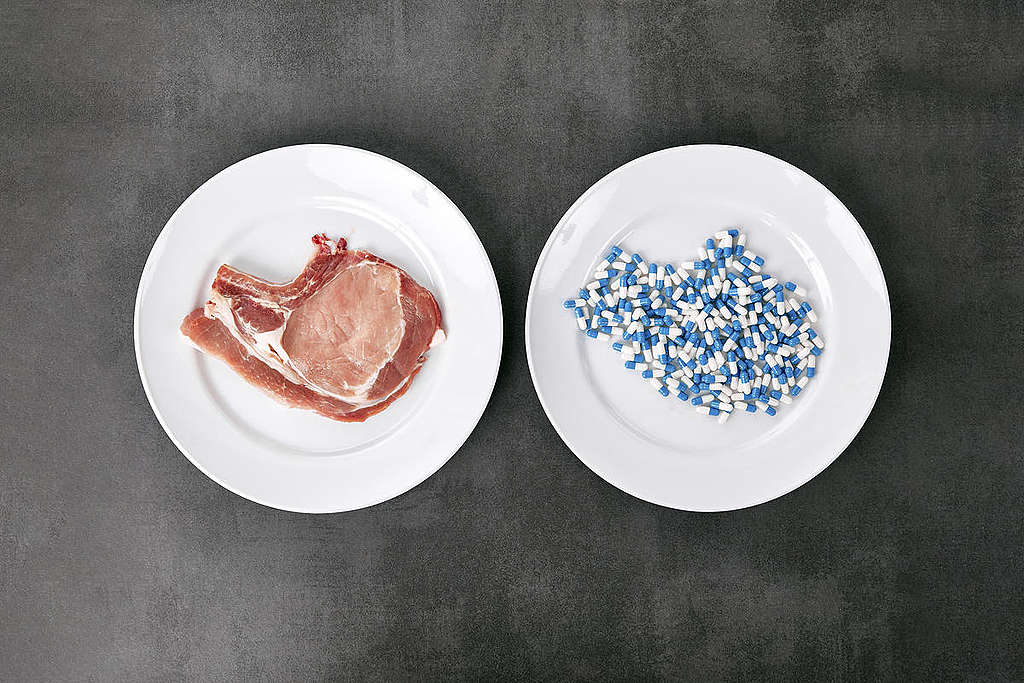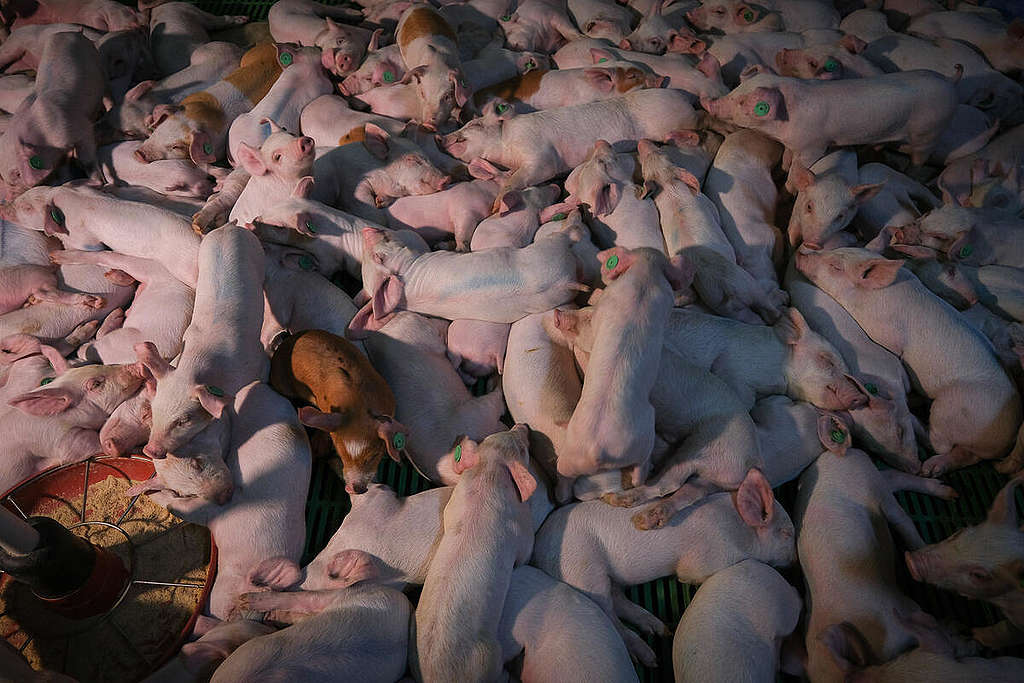Sorry, vegans: a major health organisation says that meat, eggs and milk are vital sources of much-needed nutrients, even that a diet composed of meat, eggs and milk is healthier than plant-based foods.
These are indeed the headlines you could expect after the UN’s Food and Agriculture Organisation (FAO) issued a report on the benefits and risks associated with the consumption of animal products. Not only the media, but also the livestock sector, who jumped on this new opportunity to promote meat and dairy products.
 Stylised images shot by Greenpeace Austria after the revelation of test results which showed that 36 % of pork sold in Austrian supermarkets is contaminated with antibiotic-resistant germs which pose a significant health risk for humans. © Mitja Kobal / Greenpeace
Stylised images shot by Greenpeace Austria after the revelation of test results which showed that 36 % of pork sold in Austrian supermarkets is contaminated with antibiotic-resistant germs which pose a significant health risk for humans. © Mitja Kobal / GreenpeaceWhat does this FAO report actually says?
The FAO report looked at hundreds of studies and policy papers. It argues that macro-nutrients such as protein, fats and carbohydrates and micro-nutrients are difficult to obtain from plant based foods in the required quality and quantity.
The authors warn that these nutrients have important health and development functions. Their conclusion: meat, eggs and milk are an essential source of nutrients especially for most vulnerable groups.
 October 2021, Greenpeace Spain activists enter one of the largest pig farms in the country and document serious scenes of neglected animals conditions and lack of hygiene. The Cefusa facility (El Pozo – Grupo Fuertes) in Castilléjar, Granada, Spain, is the pig farm that emits the most methane and ammonia in the country. © Pedro Armestre / Greenpeace
October 2021, Greenpeace Spain activists enter one of the largest pig farms in the country and document serious scenes of neglected animals conditions and lack of hygiene. The Cefusa facility (El Pozo – Grupo Fuertes) in Castilléjar, Granada, Spain, is the pig farm that emits the most methane and ammonia in the country. © Pedro Armestre / GreenpeaceIs it true that we can’t do without meat, eggs, and milk?
So, is it true that meat, eggs and milk contain nutritional properties that cannot be obtained from foods of plant origin? Short answer based on this FAO report: we don’t know. There is simply no guarantee that the messages are derived from independent, unbiased science. That was also the conclusion of a Belgian nutritionist and defender of evidence-based medicine who tried to fact check the claim.
When the meat and dairy industries hold the pen
But if it sounds like the livestock sector was holding the pen, that’s no coincidence. The report text has been reviewed by organisations such as the Global Dairy Platform, International Dairy Federation, International Meat Secretariat, International Natural Sausage Casing Association and International Poultry Council.
In addition, one of the writers who prepared sections of the report as well as some members of the multidisciplinary scientific advisory committee guiding the preparation of the assessment are also signatories to the Dublin Declaration. This pro-meat manifesto goes in the opposite direction of the scientific research and evidence related to the benefits of eating less meat (especially in high consuming regions), and the necessity of reducing the number of animals for the planet.
And while the Dublin Declaration may seem like a sober request to ensure healthy nutrition for all, it has been shown that most of its signatories are from the Global North countries, where we face an excessive consumption of animal proteins with related health ailments, and numerous of them have ties to the meat industry. ‘The list of signatories is a litany of animal scientists, vets, agronomists with industry ties’, as researcher Matthew Hayek put it on Twitter.
When the meat industry does exactly what Big Oil does to fight climate action
The involvement of pro-meat groups and scientists in the preparation of the FAO report raises questions on the objectivity of the conclusions that the report reached. This is especially the case in the face of the wealth of scientific evidence collected by the EAT Lancet Commission and the position of nutrition focus organisations such as British Nutrition Foundation or the American Dietetic Association that show that wholesome and well-planned plant based diets can fulfill the people’s nutritional requirements.
As the pressure to tackle the environmental, climate and health impact of heavy meat based diets grows, the meat industry seems to be resorting to the same playbook used by the fossil fuel business. It downplays its the climate impacts, disputes the accounting of the its responsibility for climate change, and funds scientists to support their agenda.
‘Keep eating meat to be healthy’ happens to be one of the main frames applied by the meat industry, according to the recent study “Meat, money and messaging”. In other words: you need meat for proteins, iron, etc. Sounds very familiar, doesn’t it?
Katarina Jurikova is a food campaigner with Greenpeace Central and Eastern Europe. Jelle De Mey is a communications specialist with Greenpeace Belgium.

 1 year ago
90
1 year ago
90
 1/13
1/13 Spreadsheet:
Spreadsheet: 
